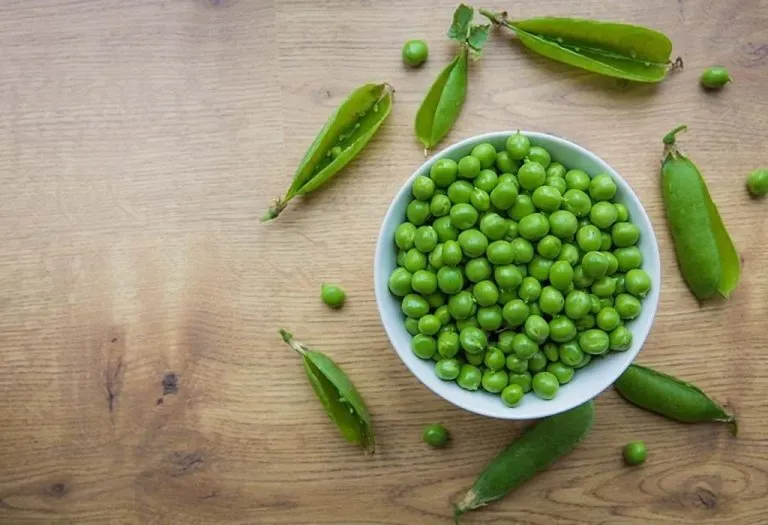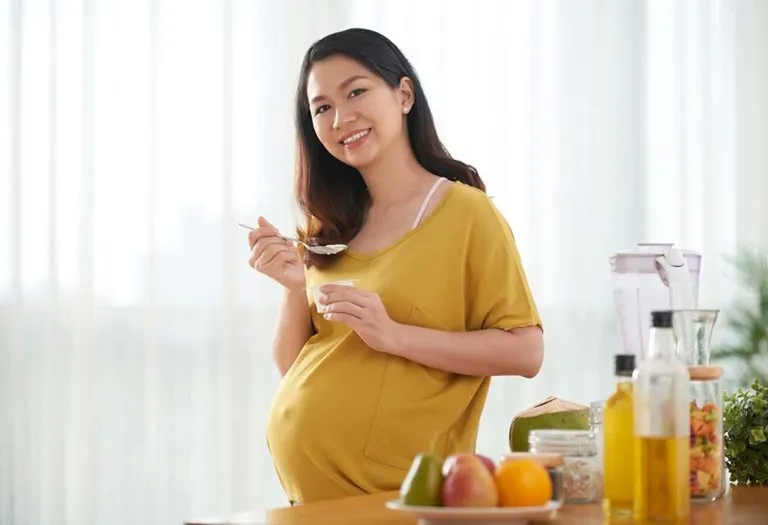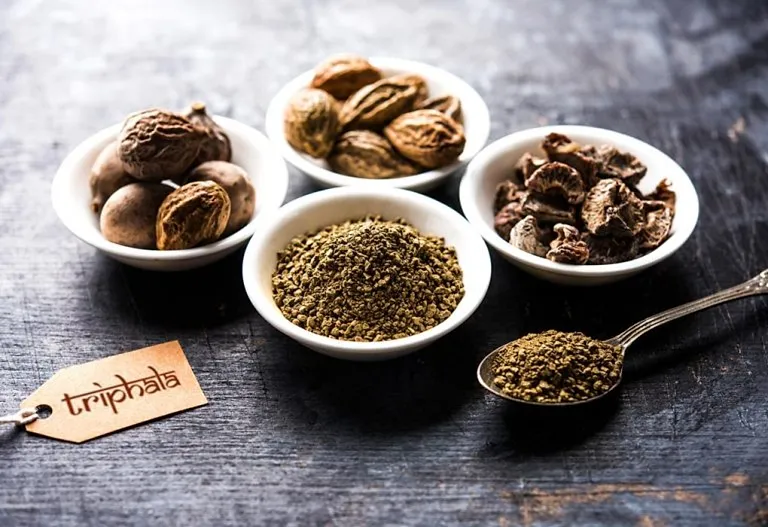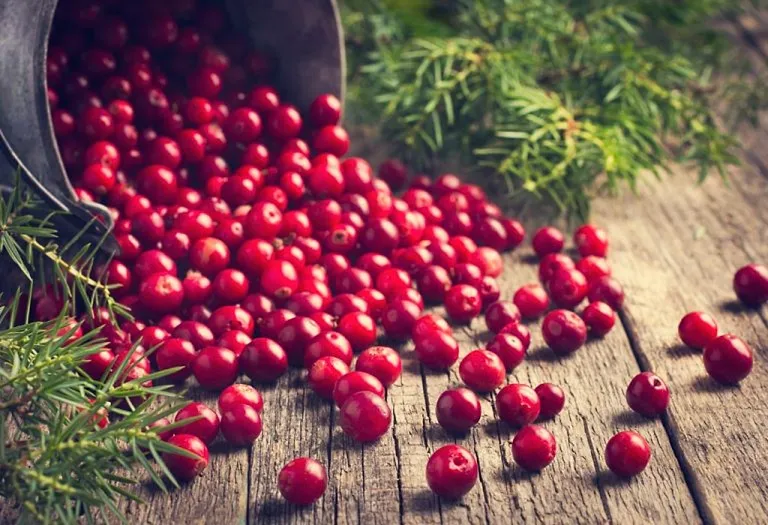Eating Green Peas During Pregnancy – Benefits & Recipes

- Nutritional Value of Green Peas
- Benefits of Consuming Peas During Pregnancy
- Green Pea Recipes for Pregnant Women
- FAQs
Expectant mothers should be aware of all the food that is good (and not good) to eat during pregnancy. While we know alcohol and coffee are better avoided, there are other foods we may not be so sure of. For example, green peas during pregnancy can be a beneficial addition to the diet due to their high content of vitamins and minerals. Expectant mothers should know what not to eat during pregnancy and what to eat to provide proper nutrition to themselves and their growing baby. This includes incorporating a variety of fruits, vegetables, lean proteins, and whole grains. Eating well during pregnancy supports the health and development of the baby and helps the mother maintain her energy levels and overall well-being.
Nutritional Value of Green Peas
Green peas might look small and humble, but they are packed with Vitamin A, Vitamin B complex, magnesium, Vitamin C, fibre and protein. They are perfect for pregnant women’s daily protein and vitamin intake.
| Principle | Nutrient Value (Per 100 gm) |
| Energy | 81kcal |
| Carbohydrates | 14.45g |
| Protein | 5.42g |
| Total Fat | 0.40g |
| Cholesterol | 0mg |
| Dietary Fibre | 5.1g |
| Vitamins | |
| Folates | 65mg |
| Niacin | 2.090mg |
| Pantothenic Acid | 0.104mg |
| Pyridoxine | 0.169mg |
| Riboflavin | 0.132mg |
| Thiamin | 0.266mg |
| Vitamin A | 765IU |
| Vitamin C | 40mg |
| Vitamin E | 0.13mg |
| Vitamin K | 24.8mg |
| Electrolytes | |
| Sodium | 5mg |
| Potassium | 244mg |
| Minerals | |
| Calcium | 25mg |
| Copper | 0.176mg |
| Iron | 1.47mg |
| Magnesium | 33mg |
| Manganese | 0.410mg |
| Selenium | 1.8mg |
| Zinc | 1.24mg |
| Phytonutrients | |
| Carotene-beta | 449mg |
| Crypto-xanthin-beta | 0mg |
| Lutein-zeaxanthin | 2477mg |
Source: USDA National Nutrient Database
Benefits of Consuming Peas During Pregnancy
There are several benefits of eating green peas when you are pregnant:
1. Rich in Folic Acid
When another human is growing inside you, you need more than ever to raise the amount of nutrients and minerals in your body. Peas contain folic acid, which is great for cell DNA synthesis. So eating peas when you are pregnant will help avoid any genetic defects in the neural tube of your baby.
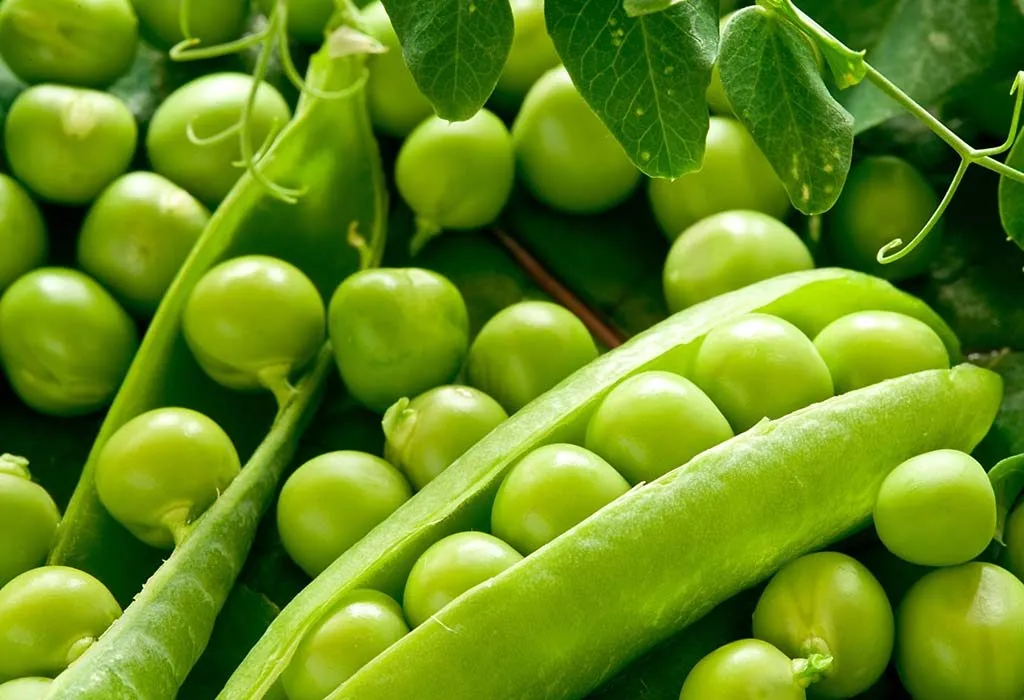
2. Heart-Healthy
Peas are packed with fibre, lycopene, and lutein, which work to maximize the heart’s function. Lycopene is an antioxidant that prevents damage to cells. Peas also contain other nutrients that help decrease LDL cholesterol levels and increase HDL cholesterol levels in the body. This is important, as too much LDL cholesterol increases plaque that builds up in the arteries, decreasing the heart’s capability to pump blood at maximum efficiency. Having a healthy heart is vital for pregnant women.

3. Rich in Vitamin B9
Vitamin B9 is known to lessen defects during pregnancy and subsequent childbirth. Peas contain high levels of Vitamin B9 which can prevent neural tube defects in your baby, which are caused by the B9 deficiency. Also, peas are legumes which are needed for the healthy cognitive functioning of their unborn babies.

4. Boosts Immunity
Peas are rich in antioxidants like flavonoids, carotenoids, and polyphenols, which help boost the immune system. A strong immune system is crucial for expectant mothers to protect themselves and their developing babies from infections.
5. Supports Digestive Health
The high fiber content in peas aids in maintaining a healthy digestive system. It helps prevent constipation, which is a common issue during pregnancy. A well-functioning digestive system ensures that nutrients are properly absorbed.
6. Provides Essential Nutrients
Peas are a good source of vitamins and minerals, including vitamins A, C, K, and iron. These nutrients are essential for the mother’s overall health and the baby’s proper development. Iron, for instance, is crucial in preventing anemia during pregnancy.
7. Promotes Healthy Weight Gain
The protein and fiber in peas can help pregnant women feel full and satisfied, preventing overeating and promoting healthy weight gain. This is important for maintaining energy levels and supporting the baby’s growth.
8. Regulates Blood Sugar Levels
Peas have a low glycemic index, which means they help regulate blood sugar levels. This is particularly beneficial for pregnant women in managing gestational diabetes and maintaining stable energy levels throughout the day.
9. Supports Eye Health
Peas contain lutein and zeaxanthin, nutrients that are beneficial for eye health. Consuming peas during pregnancy can help support the development of your baby’s eyesight and protect against vision issues in the mother.
10. Reduces Inflammation
Peas have anti-inflammatory properties due to their high content of antioxidants and phytonutrients. Reducing inflammation is important during pregnancy as it can help prevent complications and promote overall health.
Green Pea Recipes for Pregnant Women
Having green peas during early pregnancy is extremely beneficial as they are high in protein, fibre, and vitamins essential for a healthy pregnancy and easy to cook and prepare dishes with. Here are some delicious green pea recipes for pregnant women:
1. Green Pea Soup Recipe
This tasty green pea soup can be enjoyed by the entire family!
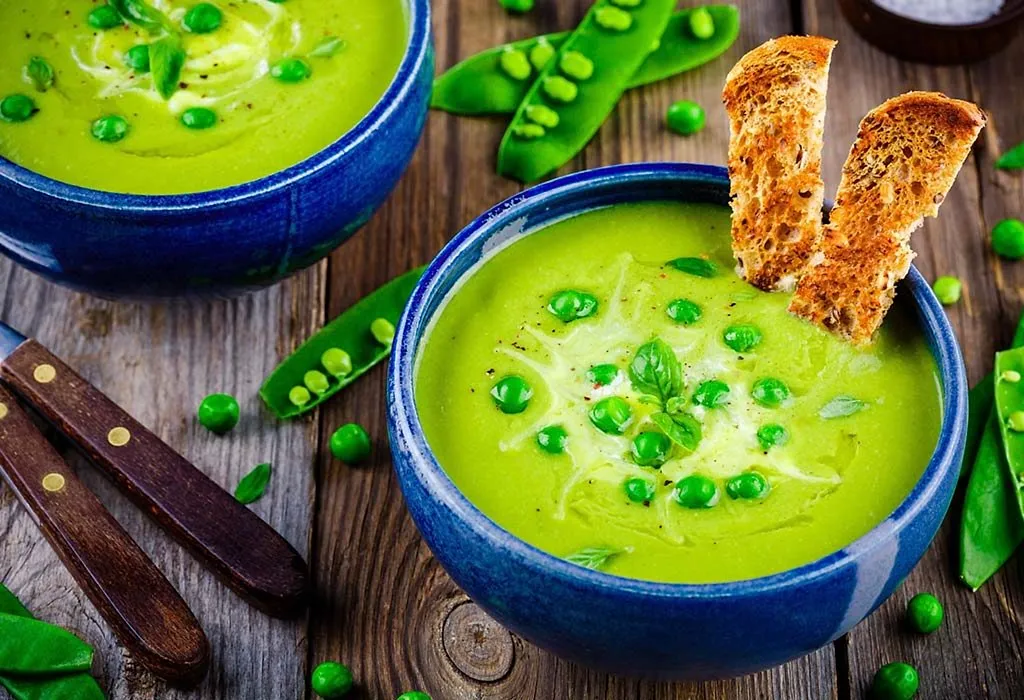
Ingredients
- 500 grams of fresh green peas
- 1 large onion (chopped finely)
- A pinch of butter or a dash of sunflower oil
- 2 cups of lamb/chicken/vegetable stock (you can use a cube)
- 1 cup of milk
- ½ cup of curd or yoghurt
- Salt and pepper to taste
- A sprig of mint
- Mint leaves (to garnish)
How to Make
- Add the chopped onions to a cooking pot and stir on medium heat along with the oil or butter, till they become translucent and soft.
- Add the peas with the hot stock. Bring it to a boil, switch to low heat, cover the pan and let simmer for around 10 minutes.
- Put in the mint sprig and blend using a handheld blender. Add the yoghurt, milk, and seasoning to taste.
- Your green pea soup is ready! You can serve it with fresh bread.
2. Green Pea and Quinoa Salad
This refreshing and nutritious salad of green peas in pregnancy is perfect for a light lunch or a side dish.
Ingredients
- 1 cup of quinoa
- 1 ½ cups of water
- 1 cup of fresh green peas
- 1 red bell pepper (diced)
- 1 cucumber (diced)
- ¼ cup of red onion (finely chopped)
- 2 tablespoons of olive oil
- 1 tablespoon of lemon juice
- Salt and pepper to taste
- Fresh parsley (chopped)
How to Make
- Rinse the quinoa under cold water. In a medium pot, combine quinoa and water, and bring to a boil. Reduce heat to low, cover, and simmer for about 15 minutes or until the quinoa is cooked and water is absorbed. Fluff with a fork and let it cool.
- Blanch the green peas in boiling water for 2-3 minutes, then transfer them to ice water to stop the cooking process. Drain and set aside.
- In a large bowl, combine the cooked quinoa, green peas, red bell pepper, cucumber, and red onion.
- In a small bowl, whisk together the olive oil, lemon juice, salt, and pepper. Pour over the salad and toss to combine.
- Garnish with chopped fresh parsley and serve.
3. Green Pea and Spinach Pesto Pasta
A delicious and healthy pasta dish that’s easy to prepare.
Ingredients
- 200 grams of whole-wheat pasta
- 1 cup of fresh green peas
- 2 cups of fresh spinach leaves
- ¼ cup of pine nuts
- 2 garlic cloves
- ¼ cup of grated Parmesan cheese
- ¼ cup of olive oil
- Salt and pepper to taste
- Fresh basil leaves (to garnish)
How to Make
- Cook the pasta according to the package instructions. Drain and set aside.
- Combine the spinach, green peas, pine nuts, garlic, Parmesan cheese, and olive oil in a blender or food processor. Blend until smooth.
- Season with salt and pepper to taste.
- Toss the cooked pasta with the green pea and spinach pesto until well coated.
- Garnish with fresh basil leaves and serve immediately.
FAQs
1. Can eating green peas help with morning sickness?
Yes, eating green peas can help with morning sickness. Green peas are a good source of B vitamins, including vitamin B6, which has been shown to help reduce nausea and vomiting during pregnancy. Incorporating green peas into your diet may help alleviate some symptoms of morning sickness.
2. How do green peas affect blood sugar levels during pregnancy?
Green peas have a low glycemic index, meaning they do not cause rapid spikes in blood sugar levels. This makes them a good food choice for managing blood sugar, especially for pregnant women with gestational diabetes. However, it’s important to monitor portion sizes and overall carbohydrate intake.
3. Can eating green peas help with hydration during pregnancy?
While green peas are not particularly high in water content compared to other fruits and vegetables, they contribute to overall hydration. Green peas contain a moderate amount of water and can be part of a balanced diet that helps maintain proper hydration levels during pregnancy.
Green peas for pregnancy may be healthy, but don’t go overboard! Two servings of peas per day are enough for a healthy pregnancy diet, and you can always mix it up with legumes other than peas for a change, too.
References/Resources:
1. Peas, green, raw; Food Data Central; U.S. Department of Agriculture; https://fdc.nal.usda.gov/fdc-app.html#/food-details/170419/nutrients
2. Taylor. S. L, Marsh. J. T, Koppelman. S. J, Kabourek. J. L, et al.; A perspective on pea allergy and pea allergens (Trends in Food Science & Technology); Science Direct; https://www.sciencedirect.com/science/article/abs/pii/S0924224421004556; October 2021
3. Eating, Diet, & Nutrition for Constipation; National Institute of Diabetes and Digestive and Kidney Diseases; https://www.niddk.nih.gov/health-information/digestive-diseases/constipation/eating-diet-nutrition
4. Foods To Be Fortified With Folic Acid; U.S. Department of Agriculture; https://agresearchmag.ars.usda.gov/1997/jun/folate/
5. Khalid. W, Arshad. M. S, Ranjha. M. M. A. N, et al.; Functional constituents of plant-based foods boost immunity against acute and chronic disorders (Open Life Sciences); National Library of Medicine; https://www.ncbi.nlm.nih.gov/pmc/articles/PMC9462539/; September 2022
6. Dahl. W, Foster. L, Tyler. R; Review of the health benefits of peas (Pisum sativum L.) (British Journal of Nutrition); National Library of Medicine; https://pubmed.ncbi.nlm.nih.gov/22916813/; August 2012
7. Legumes and Pulses; The Nutrition Source; Harvard T.H. Chan; https://nutritionsource.hsph.harvard.edu/legumes-pulses/
Also Read:
Horse Gram in Pregnancy
Can a Pregnant Woman Eat Bread?
Can You Consume Soya Bean When Pregnant?
Eating Chickpeas (Chana) during Pregnancy
Was This Article Helpful?
Parenting is a huge responsibility, for you as a caregiver, but also for us as a parenting content platform. We understand that and take our responsibility of creating credible content seriously. FirstCry Parenting articles are written and published only after extensive research using factually sound references to deliver quality content that is accurate, validated by experts, and completely reliable. To understand how we go about creating content that is credible, read our editorial policy here.







